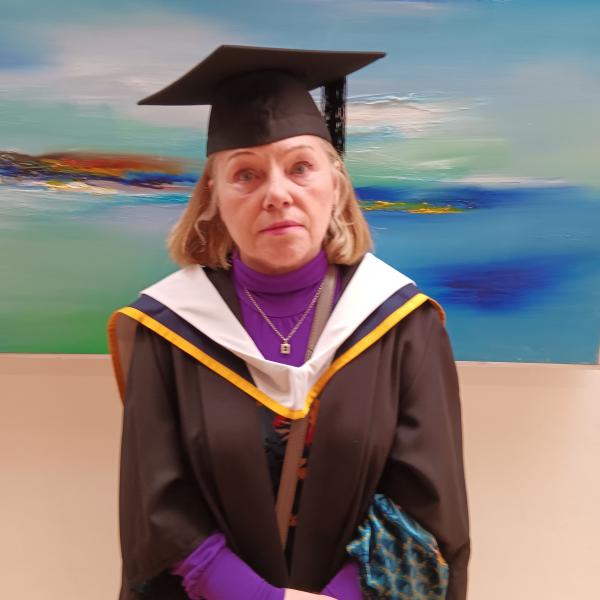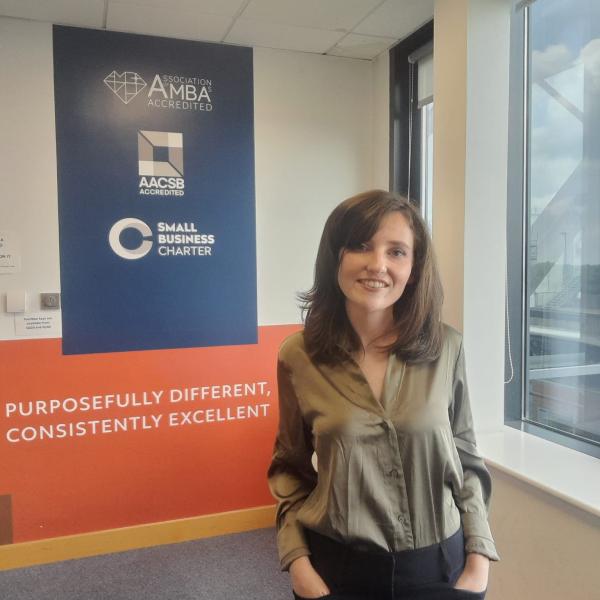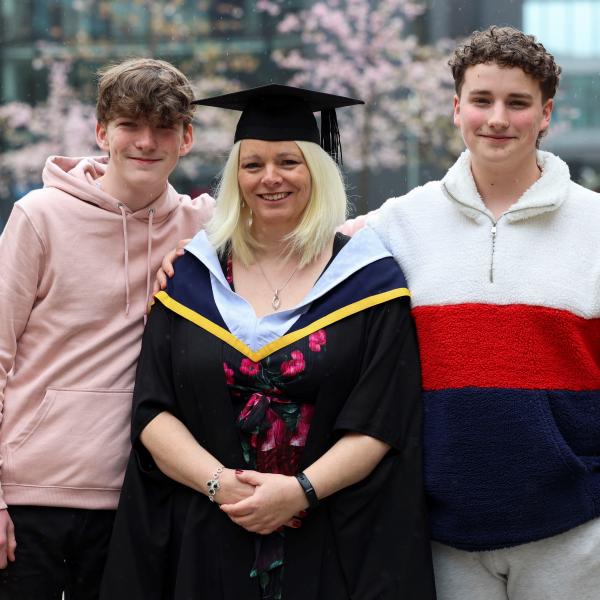Overview
Presently, we find ourselves lacking the necessary policies, institutions and societal initiatives to effectively tackle these challenges.
DCU’s MSc in Climate Change: Policy, Media & Society is unique in Ireland in its focus on the social sciences and humanities, on media, policy, law, governance, regulation and politics.
This unique and interdisciplinary programme is designed to equip students with the knowledge and skills necessary to tackle the pressing challenges of climate change from multiple perspectives.
Why DCU
DCU People

The MSc in Climate Change is an ideal fit for a non-scientist to deepen their understanding and knowledge of climate and earth sciences and my aim is to use the MSc to become a climate co
Read more about Helen Shaw

As a student on the MSc in Climate Change, I achieved a personal and professional milestone when I published my first academic article.
Read more about Niamh Reilly

“I can’t say I was scared,” says climate activist Theresa O’Donohoe, when asked about taking on a Master’s after many years away from education.
Read more about Theresa O'Donohoe
Careers & Further Options
Careers
The MSc in Climate Change: Policy, Media, and Society is a great choice for recent graduates in science, engineering, communication, social and political science, as well as for government employees working on climate policies. It's also beneficial for industry professionals who want to understand climate-related regulations, educators interested in teaching climate change and individuals from unions and NGOs who may engage in climate policy advocacy.
After completing this innovative programme, graduates will be well-prepared for careers in environmental or climate-related roles in government agencies, businesses' Environmental, Climate, or Corporate Social Responsibility departments and within civil society, whether in Ireland or abroad.
The programme will enable students currently employed to found, lead or contribute to climate action and emissions monitoring/reduction efforts of their organisations. The dissertation element will allow students to focus on their organisation as a case study.
"DCU graduates are highly sought after by employers. Our Graduates work in environments ranging from large multinationals to SMEs, family businesses and start-ups across every sector.
DCU Careers Service has a number of learning and development initiatives in place for our students, giving them the skills they need for a successful career path."
Entry Requirements
For admission to the MSc in Climate Change programme, successful applicants will have:
• A degree at the level of an Irish or UK Honours undergraduate degree (H2.2 or above) or equivalent.
• If the applicant has not yet completed their degree than a conditional offer may be made on the basis of most recent grades and pending the achievement of a H2.2 degree.
• Applicants with appropriate combinations of professional qualifications and experience may also be considered. This includes discipline-specific knowledge and know-how; transferable skills; basic research competency; personal effectiveness.
• Recognition of Prior Learning (RPL) applicants are required to submit a cover letter along with their application under the Transcripts section of the portal, affirming their intent to apply for RPL. For more information on RPL see here.
• International candidates who are non-native speakers of English must satisfy the University of their competency in the English language.
Programme Structure
Climate change has increasingly become a focal point in the realms of politics, policy development, strategic planning, business operations, and civil society. This heightened attention encompasses efforts to reduce our environmental footprint as well as initiatives aimed at fortifying our ability to withstand present and future climate challenges. On the international stage, the Paris Agreement, established during the COP21 summit in December 2015, charts a course toward complete decarbonisation of the global economy during the latter half of this century.
Dealing with climate change is not just about science and technology; it also involves politics, organisations and society as a whole. Dr. Youba Sokona, former Vice-Chair of the UN-sponsored Intergovernmental Panel on Climate Change, says, 'We can technically shift to an economy with fewer carbon emissions, but what we're missing are the right policies and institutions.”
The MSc in Climate Change: Policy, Media and Society delves into the complex interplay between climate change, policy-making, media communication and societal responses. The curriculum combines theoretical foundations with practical applications, ensuring that students gain a holistic understanding of climate change dynamics.
Students learn about key topics in climate change, such as policy and laws related to climate, how the media covers climate change, the science behind climate change and how societies can adapt. They also have the option to choose from different subjects. Additionally, students receive training in research methods and complete a dissertation.
The programme is available for both full-time and part-time students. Full-time students complete it in one year, whereas part-time students finish in two years. Part-time students have classes once a week, starting at 2pm.
Full time programme
Semester 1: Core modules
- Climate Change Policy and Governance 10 credits
- Climate Change: The Physical Science Basis 10 credits
- Climate Change and the Media 10 credits
- Research Methodology 5 credits
Semester 2: Core modules
- Climate Change and Societal Transition 10 credits
Semester 2: Optional modules - students choose two of the following modules
- Climate Change Law 10 credits
- Environmental Change and World Politics 10 credits
- Climate Change and Cities 10 credits
- Political Economy of the Environment 10 credits
- Climate Change Education 10 credits
- Future Generations: Priorities, Policies, Politics 10 credits
Year Long
- Dissertation / Capstone Project 25 credits
Part time programme
YEAR ONE
Semester 1 Core modules
- Climate Change Policy and Governance 10 credits
- Climate Change: The Physical Science Basis 10 credits
Semester 2:
Core modules
- Climate Change and Societal Transition 10 credits
Semester 2:
Optional module—students choose one of the following modules
- Climate Change Law 10 credits
- Environmental Change and World Politics 10 credits
- Climate Change and Cities 10 credits
- Political Economy of the Environment 10 credits
- Climate Change Education 10 credits
- Future Generations: Priorities, Policies, Politics 10 credits
YEAR TWO
Core modules Semester 1
- Climate Change and the Media 10 credits
-
Research Methodology 5 credits
Semester 2:
Optional module - students choose one of the following modules (excluding whichever optional module you chose in year one)
- Climate Change Law 10 credits
- Environmental Change and World Politics 10 credits
- Climate Change and Cities 10 credits
- Political Economy of the Environment 10 credits
- Climate Change Education 10 credits
- Future Generations: Priorities, Policies, Politics 10 credits
Year Long
- Dissertation / Capstone Project 25 credits
- DCU's strong track record in communication studies and legal and political science research ensures that this course is taught by experienced experts who have a deep knowledge in important subjects.
- DCU's School of Law and Government is among the top 150 in the world for Politics and International Studies and in the top 300 for Law. The School of Communications at DCU is ranked in the top 200 globally for Communication and Media Studies.
- During the programme, students will engage in interactive, hands-on, and creative teaching methods. The instructors are approachable and actively pursuing advanced research in their respective fields.
- Students will learn to assess climate change policies, rules, and laws with a critical eye. They will also develop the skills and awareness to analyse how the media and different parts of society respond to climate change.
- They will also learn about the science of climate change and understand how it fits into the larger context of politics, economics and society.
- This programme will open doors to further postgraduate studies in climate change policy, law, media, communications, education and science.
Fees and Funding
Fees
How To Apply
To apply for this programme:
All Applicants must apply through DCU's Student Application Portal which is available here. Here's a quick step by step guide if you need help with your application.
- Provide Academic Transcripts for each and every year of study with English translation if applicable.
- Provide a 500-750 word (max) personal statement including:
(i) Why you wish to study the programme;
(ii) What in your record and experience makes you suitable for the MSc programme;
(iii) The impact which you expect the MSc programme would have on your future careers. If applicable, provide evidence of competence in the
- English language as per DCU entry requirements. Please see link http://www.dcu.ie/registry/english.shtml
Please note if you are a non EU student and require a study visa, you are not eligible to apply for part-time programmes as study visas are only granted for full-time programmes.
Application Deadlines
Applications will be accepted on a rolling basis until the programme is full or until the following dates:
- Closing date for non EU applicants is 1st July 2025
- Closing date for EU applicants is 30th August 2025
Note applicants who require a study visa for the purposes of studying at DCU, are advised to apply as early as possible.
All entry requirements should be met before the commencement of the programme.
Application Queries
For EU applicant queries, please visit https://www.dcu.ie/registry/eu-postgraduate-taught-admissions or email postgraduateadmissions@dcu.ie
For non EU applicant queries, please visit https://www.dcu.ie/registry/international-admissions-undergraduate-and-postgraduate or email internationaladmissions@dcu.ie
Commencement of Programme
The programme commences in September 2025
Life On Campus
At DCU, our students can expect a unique campus experience. We are known for our excellent teaching and learning facilities, our active clubs and societies, and our great social and sporting facilities. All this makes DCU an exciting place to be.
DCU has three academic campuses; Glasnevin, St. Patrick’s and All Hallows (both in Drumcondra), all close to Dublin City centre.
They can be reached by public transport, Dublin Bus and Bus Éireann, with our Drumcondra campuses a ten minute walk from Drumcondra Train Station. Glasnevin is a 20 minute walk from St Patrick’s and All Hallows. They are also linked by Dublin Bus.
Each campus has a library (O’Reilly, Cregan and Woodlock Hall), study spaces, restaurants, and on-campus residencies. There are sports facilities on Glasnevin and St. Patrick’s, and there is a dedicated sports campus, St Claire’s, located near Glasnevin on the Ballymun Road.
DCU’s 19,000 students have access to exceptional teaching and learning facilities across our three academic campuses.
These include modern learning theatres, research centres, a new media and TV studio, radio/podcast studios, computer suites and advanced labs in the areas of Languages, Engineering, Physics, Chemistry and Biotechnology, as well as a Sports Performance centre and a training hospital ward. In 2021, we opened our first virtual reality ‘Leadership Lab’, which is located in our Business School.
We continue to improve and update our facilities. For example, construction of a new world-class STEM facility is underway on the Glasnevin campus. With capacity for an extra 3,000 STEM students, this facility will advance DCU’s international reputation for excellence in science and health, computing and engineering disciplines.
Studying in DCU isn’t just about course work. The university is rich in student life and activities.
There are more than 140 clubs and societies for students in DCU, with ‘Clubs & Socs’ days taking place on both the Glasnevin and Drumcondra campuses at the start of the academic year. They span everything from rugby to rock climbing, anime to jazz.
For many students, sport is an important part of the DCU experience. DCU’s Sports Complex boasts a 25 metre swimming pool, fitness centre gym, all-weather pitches and squash courts, as well as soccer, GAA and rugby pitches. DCU Dóchas Éireann, the university’s GAA club, is the largest third level Gaelic Games club in the country. Meanwhile, DCU Athletics has been Ireland’s highest achieving university club for many years. And DCU has dozens of other clubs to get involved in, from Archery to Weightlifting.
The Glasnevin campus is home to our purpose built, state-of-the-art student centre, The U, which serves the needs of a rapidly growing student body. Here, you will find the Student Leadership and Lifeskills Centre, performing arts and cultural spaces for students and the wider community, and the Entrepreneurship and Innovation Hub. Also located on our Glasnevin campus is The Helix, our renowned performing arts centre.
On our St Patrick’s campus, we have the Java Student Hub, a vibrant, warm and welcoming space where students can meet for coffee, play music, use the projector to watch events, or just relax. The walls of the Java Hub were designed based on the cultural history of St Patrick’s Campus, including the special references to the notable sporting history and history of the arts.
We have a number of academic, professional and social supports for students.
Student Advice & Learning Skills Centre - Offers a wide range of supports and services to students and advice
The Writing Centre - drop-in writing workshops for students through the academic year
Maths Learning Centre - provides maths support for students of all ability levels with maths modules
Student Learning - facilitate the transition from passive to active learning for students at DCU, by teaching study skills, nurturing critical thinking and building student confidence.
Careers work with students to help them on their professional journey into graduate employment.
Our student support team offers a comprehensive support programme, helping students make that all important transition into university life and focusing on building confidence and skills which are key to success at third level.

DCU Glasnevin Campus
FAQs
Is DCU all one campus?
DCU is a multi campus university - the Glasnevin, St Patrick's and All Hallows campuses. The St Patrick's campus is where the Education courses are taught and some of the subjects from the BA Joint Honours degree. There is a 20-25 minute walk between the campuses but there are buses and bikes available to go between them also.
Click here to see maps of all of our campuses
If I'm studying on the St Patrick's campus, can I use the library and sports centre on the Glasnevin campus?
Yes, all facilities such as sports and accommodation are open for all DCU students to avail of.
Are there libraries in DCU and if they have wifi and work stations?
We have a brand new state of the art four floor library on our St. Patrick's Campus which complements the existing library on the Glasnevin campus. There is free wifi, work stations as well as desktop computers.
Does DCU provide accommodation?
DCU does have on-campus accommodation for undergraduate and postgraduate students, and you can find out more and apply via the Accommodation Office webpage.







